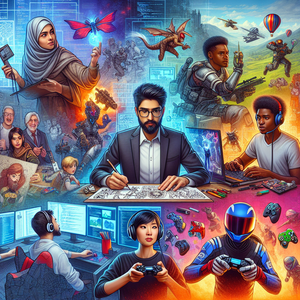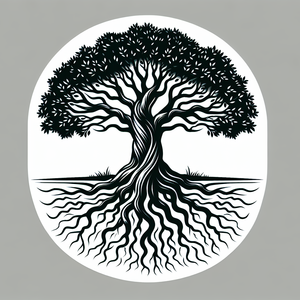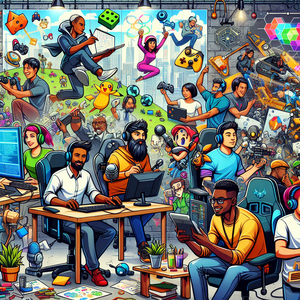The Dark Parables of Squid Game: Allegory and Social Commentary

At the heart of 'Squid Game' are the titular games, each designed to challenge contestants both physically and psychologically. While the initial premise may seem like mere entertainment, a closer look reveals that these games serve as allegories for the brutal realities of modern life. The contestants, all of whom are struggling with debts and personal failures, represent the marginalized and disenfranchised members of society. They are thrust into a high-stakes competition that mirrors the cutthroat nature of capitalism, where only a few emerge victorious while the rest face dire consequences. For instance, the game of 'Red Light, Green Light,' where players must freeze in place to avoid being eliminated, symbolizes the precarious balance between ambition and caution in a capitalist society. Contestants must navigate their desires and fears, reflecting the struggles many face in their pursuit of success. This tension exemplifies how societal pressures can force individuals into morally ambiguous situations, a recurring theme throughout the series. The game serves as a stark reminder that in the harsh landscape of capitalism, the line between success and failure can be a matter of life and death.
Class Struggle and Inequality
'Squid Game' also starkly highlights the disparities between different social classes. The wealthy elite, represented by the game's organizers and VIPs, view the games as a form of entertainment, devoid of empathy for the lives at stake. In contrast, the contestants' desperation underscores the harsh realities faced by those living in poverty. This dynamic serves as a microcosm of the broader societal issue of class struggle, illustrating how the wealthy often exploit the vulnerable for their own gain. The character of Seong Gi-hun, the protagonist, embodies this struggle. Throughout the series, Gi-hun's journey reflects the fight against systemic inequalities, as he grapples with his failures while striving to provide for his daughter. His evolution from a passive participant to an active challenger of the system mirrors the awakening of social consciousness among those who are oppressed. The overarching narrative illustrates how economic disparity can lead individuals to make life-altering decisions, ultimately driving them to extremes in the pursuit of survival.
Capitalism and Human Morality
One of the most compelling themes in 'Squid Game' is the ethical dilemmas faced by contestants as they navigate life-and-death scenarios. The pressure to survive forces individuals to make choices that reveal their moral compass. Alliances form and dissolve, and friendships are tested as contestants weigh their survival against their humanity. This exploration of morality raises questions about the lengths to which people will go when pushed to their limits. The character of Cho Sang-woo exemplifies this moral ambiguity. As a former top student, his intelligence initially positions him as a leader among the contestants. However, as the games progress, his decisions become increasingly ruthless, showcasing how desperation can erode one's ethical boundaries. His journey serves as a cautionary tale about the corrupting influence of ambition and the loss of humanity in the face of overwhelming adversity. The moral decay illustrated through characters like Sang-woo prompts viewers to reflect on how far they might go in the pursuit of success, echoing the ethical compromises often made in the real world.
'Squid Game' transcends the boundaries of traditional entertainment, offering a compelling commentary on the complexities of modern life. Through its dark parables and rich allegories, the series invites viewers to reflect on the societal structures that govern our lives, from the pervasive nature of capitalism to the systemic inequalities that persist in our world. By presenting the stark realities of survival in a hyper-competitive environment, 'Squid Game' not only captivates audiences but also challenges them to confront the moral implications of their choices. In a time when many feel the burdens of economic instability and social injustice, 'Squid Game' resonates deeply, encouraging a dialogue about the nature of humanity itself. As we navigate our own lives, the lessons embedded in this gripping narrative serve as a reminder that the games we play are often a reflection of the broader societal challenges we face. The series compels us to consider our values, the systems we inhabit, and the choices we make, ultimately urging us to strive for a more equitable and compassionate world.
Cultural Analyst
Think tanks, media organizations, and cultural institutions
Job Description
Conduct in-depth analyses of media content to uncover underlying social, political, and economic themes.
Assess the impact of cultural narratives on public perception and behavior, particularly in relation to contemporary issues.
Strong background in sociology, anthropology, or media studies, with proficiency in qualitative research methods.
Content Strategist
digital marketing agencies, media companies, and large corporations
Job Description
Develop comprehensive content plans that align with brand messaging and audience engagement strategies.
Collaborate with writers, designers, and marketing teams to produce multimedia content that resonates with target demographics.
Expertise in SEO, analytics, and audience research to optimize content performance across platforms.
Social Media Manager
marketing firms, entertainment brands, and non-profits
Job Description
Create and implement social media strategies that enhance brand visibility and engagement, particularly in relation to trending topics and cultural phenomena.
Monitor online discussions and trends to adapt messaging in real-time and engage with audiences authentically.
Strong writing skills and a deep understanding of various social media platforms and analytics tools are essential.
Marketing Research Analyst
retail companies, consumer goods firms, and market research agencies
Job Description
Analyze market conditions and consumer preferences to identify potential sales opportunities for products or services.
Utilize statistical software and data visualization tools to interpret complex data sets and present findings to stakeholders.
Proficient in survey design, data collection methodologies, and market trend analysis.
Ethics Consultant
corporations, non-profits, and governmental agencies
Job Description
Advise organizations on ethical practices and decision-making frameworks, particularly in high-stakes environments.
Facilitate discussions on moral dilemmas, helping clients navigate complex scenarios related to business and society.
Background in philosophy, law, or social sciences, with strong analytical and communication skills.


